Hey! Guess what there’s an article in ELLE Magazine today that asks if a “post-LGBT era” has arrived. I would definitely say “oh lord no” to that question, but the article contains more than just that question, it has other thoughts and ideas inside it. It starts out just talking about celebrities, which is confusing, because, well — non-heterosexual celebrities refusing to label themselves has been pretty popular for quite some time. Furthermore, celebrities, who have tightly managed public images, and orchestrated ways of speaking about themselves and evading personal questions, are dealing with a whole different set of pressures than Kids These Days when it comes to sexuality labels. So I don’t really know that Miley Cyrus and Kristen Stewart are setting a trend.
But, despite what its accompanying graphics would suggest, luckily this article talks about more than just celebrities! It goes on to surmise and then ask:
The thought of discarding it like an outdated dress feels more untethering than it does liberating, which is why I stumble on the thought that we’ve truly reached a new point in sexual liberation, where asserting an L, G, B, or T has grown obsolete. Are we really in the primordial stages of a post-coming out era? Or is this a fashionable way to stay in the closet? It is a step forward or a step backward?
Firstly — the article is pretty focused on sexual orientation, not gender, and “T” is not the same kind of “label” as L,G, or B, and shouldn’t be discussed as one. That aside, there are some interesting quotes from some interesting people in this article. Today in Slack we learned that the piece is a big conversation starter. Maybe it’s a conversation a lot of you would like to have, even!
So, we thought we’d get started by talking about how we identify, and why. I’ve got no clue if not identifying as literally nothing is becoming popular outside of Kristen Stewart refusing to grant us the honor of a headline with “Kristen Stewart” and “Lesbian” in it, but it definitely seems to be true that young people are more likely to identify as the perceived-as-more-expansive “queer” now than they used to, as data from our own Reader Surveys suggest:
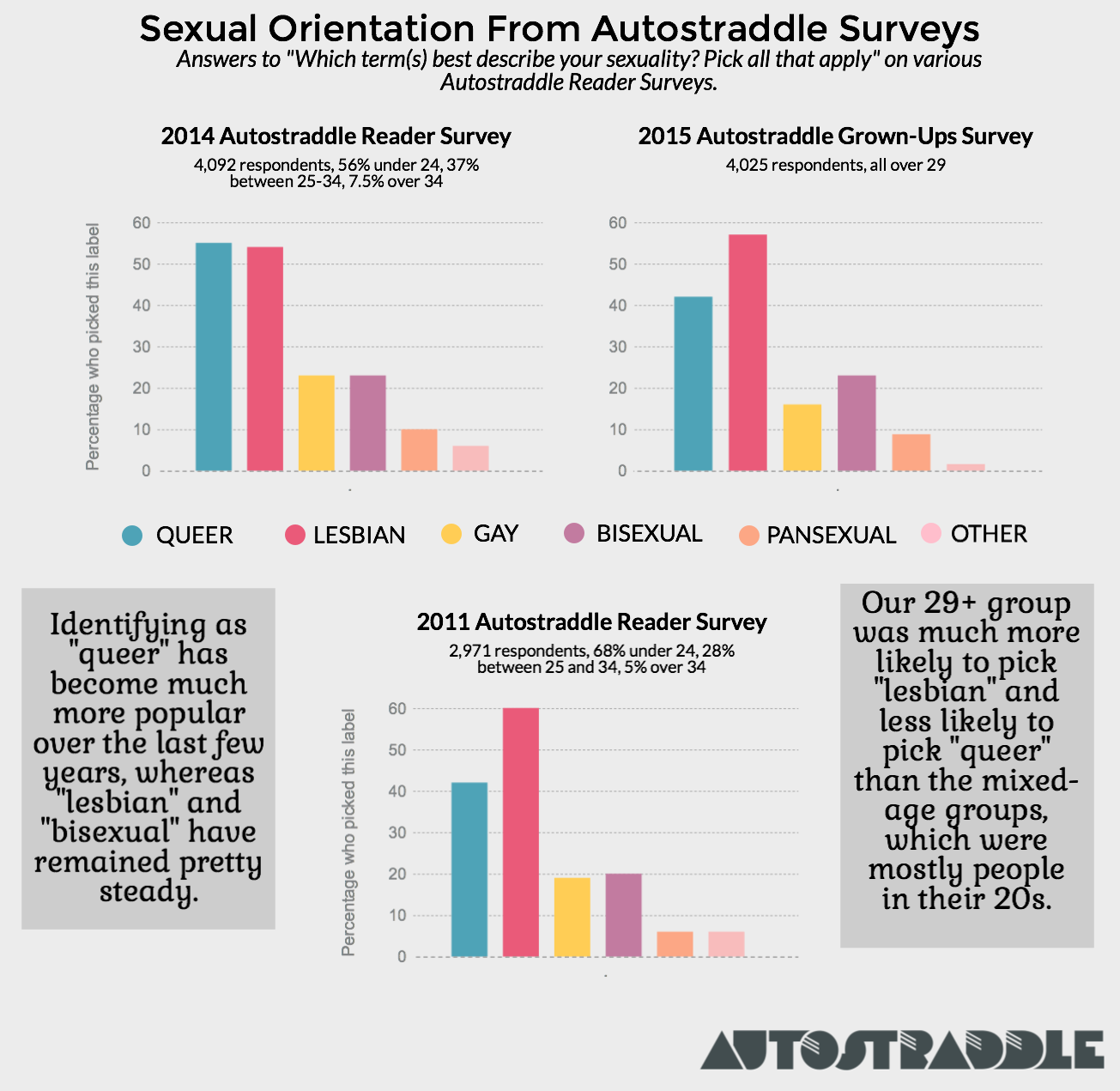
So, this is how the Autostraddle team members who were in Slack at 5PM EST today identify! I put it in order by age.
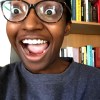 Alaina, 24, Staff Writer: I used to call myself a lesbian (sometimes), but I now almost exclusively call myself queer. I use it because of the revolutionary political implications I associate it with, but also I use it because it makes straight people so uncomfortable. They have no clue what queer means — neither for themselves nor for me. It forces straight people to look at me and sit in the uncomfortableness of not knowing who or how I fuck and demands that they respect me regardless of that. I also use it because I’m a little confused about my sexuality — it’s not stagnant, it’s always evolving and changing. And as a non-binary person, queer fits me in a way other things don’t. Because of the constraints of language, grammatically it feels weird to call myself a lesbian sometimes, and gay feels too…normative? I associate ‘gay’ with the HRC, marriage, and an obsession with proving to straight people that I’m just like they are, so pretty please don’t deny me my rights! So I like using queer because it’s non-specific enough to confuse straight people and allow me to figure myself out in the midst of all that confusion. It has it’s downfalls that I’m trying to negotiate — primarily the class/education privilege I’ve found to be associated with it — but for now, it fits.
Alaina, 24, Staff Writer: I used to call myself a lesbian (sometimes), but I now almost exclusively call myself queer. I use it because of the revolutionary political implications I associate it with, but also I use it because it makes straight people so uncomfortable. They have no clue what queer means — neither for themselves nor for me. It forces straight people to look at me and sit in the uncomfortableness of not knowing who or how I fuck and demands that they respect me regardless of that. I also use it because I’m a little confused about my sexuality — it’s not stagnant, it’s always evolving and changing. And as a non-binary person, queer fits me in a way other things don’t. Because of the constraints of language, grammatically it feels weird to call myself a lesbian sometimes, and gay feels too…normative? I associate ‘gay’ with the HRC, marriage, and an obsession with proving to straight people that I’m just like they are, so pretty please don’t deny me my rights! So I like using queer because it’s non-specific enough to confuse straight people and allow me to figure myself out in the midst of all that confusion. It has it’s downfalls that I’m trying to negotiate — primarily the class/education privilege I’ve found to be associated with it — but for now, it fits.
 Maddie, 24, Staff Writer: I identify as queer because it makes me feel good and it also is accurate because I’m attracted to people of various genders. I don’t really care if people call me gay or lesbian, but I like it better if they say that while at least knowing that my sexual orientation is a little more complex than those words’ direct meanings.
Maddie, 24, Staff Writer: I identify as queer because it makes me feel good and it also is accurate because I’m attracted to people of various genders. I don’t really care if people call me gay or lesbian, but I like it better if they say that while at least knowing that my sexual orientation is a little more complex than those words’ direct meanings.
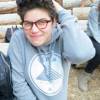 Carmen, 25, Straddleverse Editor: I identify with lots of words / ideas: lesbian, gay, queer being the most prominent. I struggled for hella long when I realized I wasn’t straight to pick a label that fit, and the finality freaked me out — but lesbian felt right nonetheless. after all, that’s what I am! A gay chick who likes gay chicks. (And look! There’s the “gay” thing. You can call me gay, that’s cool. It’s not just for dudes anymore. Maybe.) I also revel in IDing as “queer” because i think it aligns a lot with my self-perception as a fringe-y weirdo outsider who also has some leftist policies, and also because it reminds me that I’m one of many brilliant shining stars who experience their sexualities similarly and differently from me but are still my companions in this strange world.
Carmen, 25, Straddleverse Editor: I identify with lots of words / ideas: lesbian, gay, queer being the most prominent. I struggled for hella long when I realized I wasn’t straight to pick a label that fit, and the finality freaked me out — but lesbian felt right nonetheless. after all, that’s what I am! A gay chick who likes gay chicks. (And look! There’s the “gay” thing. You can call me gay, that’s cool. It’s not just for dudes anymore. Maybe.) I also revel in IDing as “queer” because i think it aligns a lot with my self-perception as a fringe-y weirdo outsider who also has some leftist policies, and also because it reminds me that I’m one of many brilliant shining stars who experience their sexualities similarly and differently from me but are still my companions in this strange world.
 Audrey, 25, Staff Writer: I identify as bisexual because it best describes my sexual and relationship behavior and because it feels crucial to speak out from a bi position given that bisexual people face the most violence and get the fewest resources in the LGB community. I identify as queer because queerness is at the root of my community, my politics and my gender. I sometimes say that I was born bisexual and choose queerness.
Audrey, 25, Staff Writer: I identify as bisexual because it best describes my sexual and relationship behavior and because it feels crucial to speak out from a bi position given that bisexual people face the most violence and get the fewest resources in the LGB community. I identify as queer because queerness is at the root of my community, my politics and my gender. I sometimes say that I was born bisexual and choose queerness.
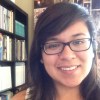
Yvonne, 25, Senior Editor: I’m a woman who loves women. I most identify as a lesbian because it deliberately rejects men from my association —which I like very much — and most importantly it centers women in my identity. I also like to reaffirm the lesbian identity because it’s usually associated with older generations who aren’t inclusive so I like to show people that lesbians are radical in their politics and worldview and want progress for the entire queer community.
 Raquel, 27, Intern:
Raquel, 27, Intern:
 Rachel, 27, Senior Editor: I identify as
Rachel, 27, Senior Editor: I identify as
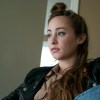 Erin, 29, Staff Writer: I identify as gay and qualify that as having no interest in cis men.
Erin, 29, Staff Writer: I identify as gay and qualify that as having no interest in cis men.
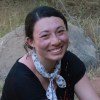 Laura M, 29, Staff Writer: I identify as “queer,” “bisexual misandrist” and also “lesbian.”
Laura M, 29, Staff Writer: I identify as “queer,” “bisexual misandrist” and also “lesbian.”
 Mey, 29, Trans Editor: I identify as a lesbian but I also identify as queer. I like lesbian because it makes it clear I’m in no way interested in men and queer because it sounds political and radical and it makes old people feel weird.
Mey, 29, Trans Editor: I identify as a lesbian but I also identify as queer. I like lesbian because it makes it clear I’m in no way interested in men and queer because it sounds political and radical and it makes old people feel weird.
 Stef, 32, Music Editor: I guess I identify as queer or “equal opportunity” but usually when people ask me how I identify I say I don’t.
Stef, 32, Music Editor: I guess I identify as queer or “equal opportunity” but usually when people ask me how I identify I say I don’t.
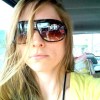 Laneia, 34, Executive Editor: I mostly call myself queer. I like that the word itself is off-putting to most straight people, and I like that the dictionary definition of queer is “weird,” because that’s something I’ve been called since Kindergarten. I embraced my weirdness early on, so after embracing my big ol’ gayness, I decided I felt most connected to queer. I love that this one little word encompasses so much of who I actually am: a happy, unapologetic lesbian who enjoys making normcore heterosexuals feel uncomfortable and out of the loop.
Laneia, 34, Executive Editor: I mostly call myself queer. I like that the word itself is off-putting to most straight people, and I like that the dictionary definition of queer is “weird,” because that’s something I’ve been called since Kindergarten. I embraced my weirdness early on, so after embracing my big ol’ gayness, I decided I felt most connected to queer. I love that this one little word encompasses so much of who I actually am: a happy, unapologetic lesbian who enjoys making normcore heterosexuals feel uncomfortable and out of the loop.
 Riese, 34, Editor-in-Chief: I sometimes say that I am bisexual by birth, lesbian by choice. Or something. On the day-to-day I don’t really care — queer, lesbian, gay, whatever. If I had to pick one, I’d pick “queer,” because it honors who I was (bisexual) and who I am (lesbian) and it’s a weirdo word and I’m a weirdo. But the more I get into studying lesbian history, the more I find myself drawn to “lesbian.” So many women fought so hard to live openly as lesbians and to find pride in that identity and I don’t want to reject/disregard that history, I want to embrace it and understand it and build on it, not against it. (I also like that it’s a word men can’t use.) I feel weird about people saying they “reject” labels — like, you can say that labels aren’t for you, personally, without acting like labels are suffocating or retro. In straight spaces, I usually just say “gay” / hope that nobody talks to me.
Riese, 34, Editor-in-Chief: I sometimes say that I am bisexual by birth, lesbian by choice. Or something. On the day-to-day I don’t really care — queer, lesbian, gay, whatever. If I had to pick one, I’d pick “queer,” because it honors who I was (bisexual) and who I am (lesbian) and it’s a weirdo word and I’m a weirdo. But the more I get into studying lesbian history, the more I find myself drawn to “lesbian.” So many women fought so hard to live openly as lesbians and to find pride in that identity and I don’t want to reject/disregard that history, I want to embrace it and understand it and build on it, not against it. (I also like that it’s a word men can’t use.) I feel weird about people saying they “reject” labels — like, you can say that labels aren’t for you, personally, without acting like labels are suffocating or retro. In straight spaces, I usually just say “gay” / hope that nobody talks to me.
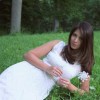 Aja, 35, Beauty Editor: I identify as a lesbian, married w/ child.
Aja, 35, Beauty Editor: I identify as a lesbian, married w/ child.
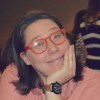 Heather, 37, Senior Editor: I identify as a lesbian because I’m a woman who is primarily attracted to and only interested in having romantic relationships with other woman. And while I also label myself as gay and queer, I prefer lesbian because it’s a word that struck terror into my heart for so long because of my religious upbringing and I distanced myself from it as far as possible for two decades of my life — but after I came out and embraced it, I found that “lesbian” didn’t seek to alienate me, but rather to connect me to a sacred and powerful history of women (women, women, women, and only women) just like me.
Heather, 37, Senior Editor: I identify as a lesbian because I’m a woman who is primarily attracted to and only interested in having romantic relationships with other woman. And while I also label myself as gay and queer, I prefer lesbian because it’s a word that struck terror into my heart for so long because of my religious upbringing and I distanced myself from it as far as possible for two decades of my life — but after I came out and embraced it, I found that “lesbian” didn’t seek to alienate me, but rather to connect me to a sacred and powerful history of women (women, women, women, and only women) just like me.

